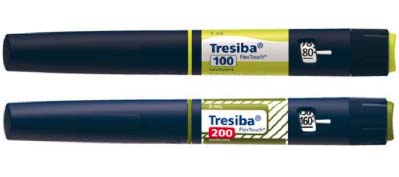
|
|
||||
Insulin degludec is a man-made product that is similar to human insulin. It replaces the insulin that your body would normally make. It acts longer than regular insulin, providing a low, steady level of insulin. It works by helping blood
sugar (glucose) get into cells so your body can use it for energy. Insulin degludec may be used with a shorter-acting insulin product. It may also be used alone or with other diabetes drugs.  POSSIBLE SIDE EFFECTS Tell your doctor right away if you have any serious side effects, including: signs of low potassium level in the blood (such as muscle cramps, weakness, irregular heartbeat). This medication can cause low blood sugar (hypoglycemia). This may occur if you do not consume enough calories from food or if you do unusually heavy exercise. Symptoms of low blood sugar include sudden sweating, shaking, fast heartbeat, hunger, blurred vision, dizziness, or tingling hands/feet. It is a good habit to carry glucose tablets or gel to treat low blood sugar. If you don't have these reliable forms of glucose, rapidly raise your blood sugar by eating a quick source of sugar such as table sugar, honey, or candy, or drink fruit juice or non-diet soda. Tell your doctor right away about the reaction and the use of this product. To help prevent low blood sugar, eat meals on a regular schedule, and do not skip meals. Check with your doctor or pharmacist to find out what you should do if you miss a meal. Symptoms of high blood sugar (hyperglycemia) include thirst, increased urination, confusion, drowsiness, flushing, rapid breathing, and fruity breath odor. If these symptoms occur, tell your doctor right away. Your dosage may need to be increased. A very serious allergic reaction to this drug is rare. However, get medical help right away if you notice any symptoms of a serious allergic reaction, including: rash, itching/swelling (especially of the face/tongue/throat), severe dizziness, trouble breathing. PRECAUTIONS Before using insulin degludec, tell your doctor or pharmacist if you are allergic to it; or if you have any other allergies. This product may contain inactive ingredients, which can cause allergic reactions or other problems. Talk to your pharmacist for more details. Do not use this medication when you have low blood sugar (hypoglycemia). Before using this medication, tell your doctor or pharmacist your medical history, especially of: kidney disease, liver disease. You may experience blurred vision, dizziness, or drowsiness due to extremely low or high blood sugar levels. Do not drive, use machinery, or do any activity that requires alertness or clear vision until you are sure you can perform such activities safely. Limit alcohol while using this medication because it can increase your risk of developing low blood sugar. INTERACTIONS Drug interactions may change how your medications work or increase your risk for serious side effects. This document does not contain all possible drug interactions. Keep a list of all the products you use (including prescription/nonprescription drugs and herbal products) and share it with your doctor and pharmacist. Do not start, stop, or change the dosage of any medicines without your doctor's approval. A product that may interact with this drug is: rosiglitazone. Beta-blocker medications (such as metoprolol, propranolol, glaucoma eye drops such as timolol) may prevent the fast/pounding heartbeat you would usually feel when your blood sugar level falls too low (hypoglycemia). Other symptoms of low blood sugar, such as dizziness, hunger, or sweating, are not affected by these drugs. Many drugs can affect your blood sugar levels, making it more difficult to control your blood sugar. Before you start, stop, or change any medication, talk with your doctor or pharmacist about how the medication may affect your blood sugar. Check your blood sugar levels regularly as directed by your doctor. Tell your doctor about the results and of any symptoms of high or low blood sugar. Your doctor may need to adjust your anti-diabetic medication, exercise program, or diet. | ||||